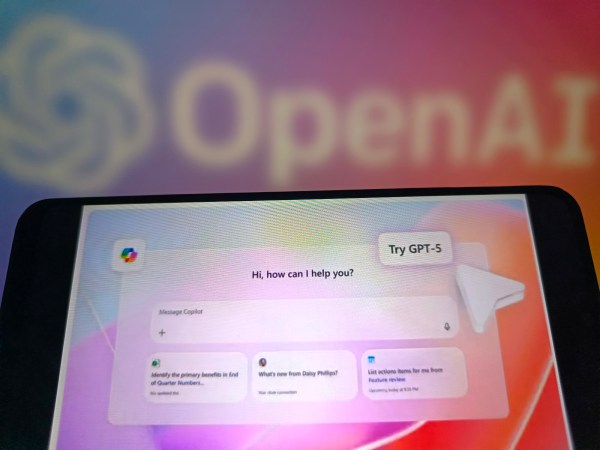Large language models (LLMs) have signaled the crossing of an AI Rubicon, one that has induced fatalism from some and unfettered optimism in others. The latter comes primarily from the tech world, and ranges from the belief that LLMs will simply make life easier to the belief that they will fundamentally hack human life as we know it. Following this, the danger AI poses is not in some existential threat to humanity or the decimation of employment but in the ubiquitous acceptance of the “hack” mindset—and the flattening of humanity it could induce.
What LLMs so far offer is not a remarkable new invention so much as a technical upgrade to a thoughtless process that the famed writer George Orwell scorned in his 1945 essay “Politics and the English Language.” Orwell noticed that writers were outsourcing thought to vague words and phrases that stripped language of meaning; they were using phrases like objective considerations, exhibit a tendency to, make itself felt, have the effect of, etc. “I do not know if,” became “I am not, indeed, sure whether it is not true to say that …” As a result, the writing process was ceasing to be an artistic enterprise and, in Orwell’s words, “The concrete melts into the abstract and no one seems able to think of turns of speech that are not hackneyed: prose consists less and less of words chosen for the sake of their meaning, and more and more of phrases tacked together like the sections of a prefabricated hen-house.” He went on to say of these phrases: “They will construct your sentences for you—even think your thoughts for you, to a certain extent—and at need they will perform the important service of partially concealing your meaning even from yourself.”
Orwell’s argument was about the folly of making creative processes mechanical and the degradation of the mind as a result of this expedience. When one outsources thought, their mind ceases to operate in the creative and ineffable way that makes them human. The craftsman becomes the assembler. Man trades his chisels for the monotony of the machine press. The complex interworking of the human mind begins to look more like the factory floor at a Ford plant than anything else.
LLMs repeatedly predict the next word based on large datasets until they have constructed sentences and paragraphs, much like the prefabricated henhouses of sentence construction that Orwell reviled. And in this way LLMs are not new. They are simply a more impressive, updated form of the cheap and lazy process Orwell observed. The human brain had already been acting as its own LLM, predicting the next most likely word or phrase to follow the one just used. I commend the tech entrepreneurs who have found a way to make this preexisting thoughtless process more efficient. However, this does not represent how computers are capable of human consciousness and creativity, as many have argued—rather, it has revealed the vapid lack of consciousness and creativity with which many of us construct thought.
Put another way, these innovations have continually been described as indications that technology is capable of consciousness. But in reality, they illuminate how truly absentminded and insufficient these processes that Orwell described are. Today’s LLM says, “These uses of the mind are so barren that we can train carefully arranged silicon to perform them.” Not, “This computer has reached the heights of human consciousness.” Indeed, if you do think that LLMs are close to replacing the human mind entirely, that’s a signal that more should be demanded of you.
It is exhausting to cultivate the skills necessary to build complex and precise thoughts and arguments, but it is worth it. The implementation of AI into one’s own personal life may improve quantitative output in the short term, but at the cost of atrophying one’s mind in the process. Or at the very least, ceasing to develop that mind. Depending on AI will lower the ceiling of what complex thought a human is capable of, in the name of raising the ceiling on vapid quantitative outputs. It is a short-circuiting of the painful process of self-discovery and wisdom accumulation by fashioning life as simply a means to an end. But the means themselves are the whole point.
In his 1950 Nobel Prize speech, William Faulkner said, “The young man or woman writing today has forgotten the problems of the human heart in conflict with itself which alone can make good writing because only that is worth writing about.” The mental manufacturing processes of Faulkner and Orwell’s era and the more modern ones of our own bypass this conflict of the human heart with itself, to the detriment of the heart and the self.
But it is not writers alone who stand to lose out when we outsource the processes of our minds. The engineer, the carpenter, the auto mechanic, the baker, and many more can all flatten their minds in the name of freeing up time and reducing effort. It's a taxi ride to the finish line that imagines the spoils of victory and the ornaments of accomplishment will be just as sweet as if one had ran the race.
The ancient Greek philosopher Xenophon describes it well in The Education of Cyrus: “Let him learn the lesson that man’s enjoyment of all good things is in direct proportion to the pains he has undergone to gain them. Toil is the seasoning of delight; without desire and longing no dish, however costly, could be sweet.”
The pleasure of ease has been in tension with the ambition of the human spirit since the beginning of humanity. The idea that within the purview of possible human achievement there is a technological advancement that releases man from this eternal trade-off is the most foolish assumption one could conceive of. I never expected the tech community to be wise enough to see this—man has seldom ever noticed his own smallness—just that the world would not be so taken by the folly and conceit of men with narrow expertise. We would not imagine that the thoughts and perspectives of even the world’s greatest insurance salesmen, chefs, or bricklayers on how their industries could make your life easier would be instructive to how we should construct our entire lives and thought processes. I find it strange that we have made an exception for men who are good with computers.






Please note that we at The Dispatch hold ourselves, our work, and our commenters to a higher standard than other places on the internet. We welcome comments that foster genuine debate or discussion—including comments critical of us or our work—but responses that include ad hominem attacks on fellow Dispatch members or are intended to stoke fear and anger may be moderated.
With your membership, you only have the ability to comment on The Morning Dispatch articles. Consider upgrading to join the conversation everywhere.